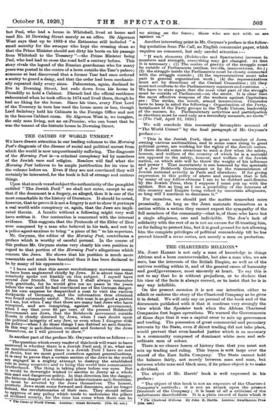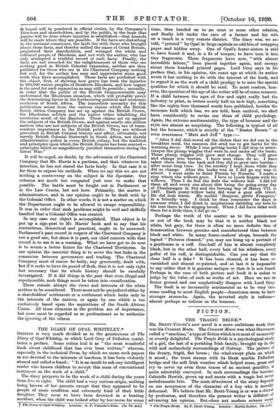THE CHARTERED MILLIONS:* M. JOHN HARRIS is not only a
man of knowledge in things African and a keen controversialist, but also a man who, we are sure, has the interests of the British Empire, as well as of the natives residing within it, and of the general cause of humanity and goodfgovernance, most sincerely at heart. To say this is not to say that he is without prejudices, or to declare that his view of the facts is always correct, or to insist that he is in any way infallible.
On the present occasion it is not our intention either to admit or endorse the story of the Chartered Company as he gives it in detail. We will only say on perusal of the book and of the documents published with it that it confirms very strongly the view which the Spectator took when the African Chartered Companies first began operations. We warned the Governments of those days that it was a capital error to mix up governance and trading. The possession of great commercial and pecuniary interests by the State, even if direct trading did not take place, would prevent that even-handed justice which is so necessary in a community composed of dominant white men and sub- ordinate men of colour.
There is no clearer lesson of history than that you must not mix up trading and mling. This lesson is writ large over the record of the East India Company. The State cannot hold the balance fairly, not merely between man and man, but between white man and black man, if its prime object is to make a dividend.
The object of Mr. Harris' book is well expressed in his preface : " The object of this book is not an exposure of the Chartered Company's methods ; it is not an attack upon the present Directors of the Company ; it is lead of all a criticism of the unfortunate shareholders. It is a plain record of facts which it
• The Ckertered Miltiona. By John H. Hann. London: Swarthmore Plea [15e. 55t4 Is hoped will be pondered in official circles, by the Company's Directors and shareholders, and by the public, in the hope that justice will be done where injustice is established—that amends will be made where they are possible. If the facts are disturbing to the national conscience, the fault lies with those who brought about these facts, and thereby sullied the name of Great Britain, prejudiced their shareholders, and wronged the white and coloured people of Rhodesia, and not with the author, who has only attempted a truthful record of such facts. Finally, the facts are not recorded for the-enlightenment of those who see nothing good in British Colonial expansion, neither are they published for those who see in the Chartered Company nothing but evil, for the author has seen and appreciates some good work they have accomplished. These facts are published with the object, first, of showing how grave has been the injustice to 800,000 native peoples of Southern Rhodesia, and how urgent is the need for such reparation as may still be possible ; secondly, in order that the public of the British Commonwealth may understand the Rhodesian eituation, which will probably prove the determining factor in the forthcoming political and economic evolution of South Africa. The immediate necessity for this publication arises from the various claims which the British South Africa Company has set up against the British Crown, the Rhodesian settlers and the native tribes inhabiting the territories south of the Zambesi. Those claims set up against the subjects of the British Crown, and against nearly one million natives who are not subjects of the British Crown, are of trans- cendent importance to the British public. They are without precedent in British Colonial history and affect, ultimately, not merely British Colonial Statecraft m South Africa, not merely administrative policy in every British colony, but the tradition and principles upon which the British Empire has been erected— principles which so magnificently justified themselves during the Great War."
It will be urged, no doubt, by the advocates of the Chartered Company that Mr. Harris is a partisan, and that, whatever his intention, he has not stated the facts fairly. In that case it is for them to expose his methods. When we say this we are not inviting a controversy on the subject in the Spectator. Our columns are much too congested just now to make that possible. The battle must be fought out in Parliament or in the Law Courts, but not here. Primarily, the matter is administrative, and in our opinion ought to be dealt with by the Colonial Office. In other words, it is not a matter on which the Department ought to be allowed to escape responsibility. It was in order that such problems might be well and skilfully handled that a Colonial Office was created.
In any ease our object is accomplished. That object is to put up a sign-post to Mr. Harris' book and to say that his contentions, theoretical and practical, ought to be answered. Parliament's past record in respect of the Chartered Company is not a good one, but since it is past, our chief concern with that record is to use it as a warning. What we have got to do now is to secure a better future for the Chartered Territories. In our opinion the essential thing is to sever the last links in the connexion between governance and trading. The Chartered Company must of course be fairly, nay generously, dealt with, but if it seeks to have its pound of flesh, then it is not only right but necessary that its whole history should be carefully investigated. If it did things in the past that were illegal and reprehensible, such things must be taken into consideration.
There remain always the views and interests of the white settlers to be considered. These must not be prejudiced either by a shareholders' settlement or a settlement which looks only to the interests of the natives, or again by one which is too exclusively based upon the aspirations of the South African Union. All these elements in the problem are of importance, but none must be regarded as so predominant as to authorize the ignoring of the others.







































 Previous page
Previous page